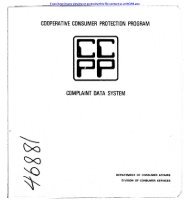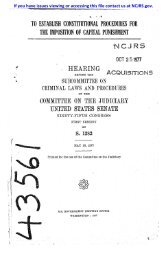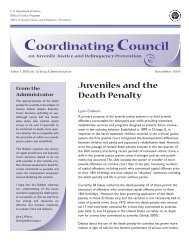Conflict Resolution Education - National Criminal Justice Reference ...
Conflict Resolution Education - National Criminal Justice Reference ...
Conflict Resolution Education - National Criminal Justice Reference ...
You also want an ePaper? Increase the reach of your titles
YUMPU automatically turns print PDFs into web optimized ePapers that Google loves.
accommodating others lose, in the sense that their<br />
basic needs are not acknowledged or met. Often,<br />
individuals who avoid conflict see themselves as<br />
victims, and their relations with others suffer.<br />
Hard responses also typically result in two types<br />
of outcomes. Win-lose outcomes occur when the<br />
more aggressive party wins and the adversary loses.<br />
Hard responses to conflict often lead to a situation<br />
in which the desire to punish or get even provokes<br />
adversaries to take vindictive actions that harm<br />
themselves as well as their opponents. This results<br />
in a lose-lose outcome. Stressful situations follow<br />
when these adversaries are required to continue to<br />
interact in some manner.<br />
Principled responses to conflict typically lead to a<br />
win-win outcome. Using a problem-solving process<br />
based on principled negotiation theory, individuals<br />
in conflict come to consensus on a joint resolution<br />
without locking into positions or destroying relationships.<br />
The interests and needs of each party in the<br />
dispute are met.<br />
Problem-Solving Processes<br />
The structured problem-solving processes of conflict<br />
resolution are negotiation, mediation, and consensus<br />
decisionmaking. 4 All problem-solving processes in<br />
conflict resolution are based on integrated negotiation<br />
theory. In conflict resolution literature and<br />
practice, the terms “negotiation” and “mediation”<br />
are often used interchangeably. In this Guide, the<br />
three structured problem-solving processes are<br />
defined as follows:<br />
♦ Negotiation is a problem-solving process in<br />
which either the two parties in the dispute<br />
or their representatives meet face to face to<br />
work together unassisted to resolve the dispute<br />
between the parties.<br />
♦ Mediation is a problem-solving process in which<br />
the two parties in the dispute or their representatives<br />
meet face to face to work together to resolve<br />
the dispute assisted by a neutral third party called<br />
the “mediator.”<br />
10<br />
♦ Consensus decisionmaking is a group problemsolving<br />
process in which all of the parties in the<br />
dispute or representatives of each party collaborate<br />
to resolve the dispute by crafting a plan<br />
of action that all parties can and will support.<br />
This process may or may not be facilitated by<br />
a neutral party.<br />
Principles of <strong>Conflict</strong> <strong>Resolution</strong><br />
Effective implementation of the conflict resolution<br />
processes of negotiation, mediation, or consensus<br />
decisionmaking requires an understanding of the<br />
following four essential principles:<br />
♦ Separate people from the problem. Every problem<br />
involves both substantive issues and relationship<br />
issues. By separating these issues, individuals<br />
come to see themselves as working side by side,<br />
attacking the problem, not each other. Fisher and<br />
colleagues state, “Where perceptions are inaccurate,<br />
you can look for ways to educate. If emotions<br />
run high, you can find ways for each person<br />
involved to let off steam. Where misunderstanding<br />
exists, you can work to improve communication.”<br />
5<br />
♦ Focus on interests, not positions. Understanding<br />
the difference between positions and interests<br />
is crucial to problem solving. Interests, not positions,<br />
define the problem. Positions are something<br />
that individuals decide they want; interests are<br />
the underlying motivations behind the positions<br />
they take. Fisher and colleagues note that “compromising<br />
between positions is not likely to produce<br />
an agreement which will effectively take<br />
care of the human needs that led individuals to<br />
adopt those positions.” 6 Where such interests<br />
are not identified, temporary agreements may<br />
be reached, but typically do not last because the<br />
real interests have not been addressed.<br />
♦ Invent options for mutual gain. Disputants<br />
focus on identifying options for resolving the conflict<br />
without the pressure of reaching a decision.<br />
A brainstorming process is used to invent a wide<br />
range of options that advance shared interests and<br />
creatively reconcile differing interests. The key<br />
ground rule to brainstorming is to postpone criticism<br />
and evaluation of the ideas being generated.

















